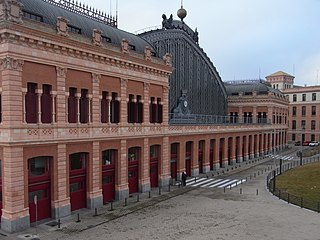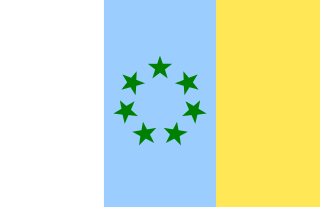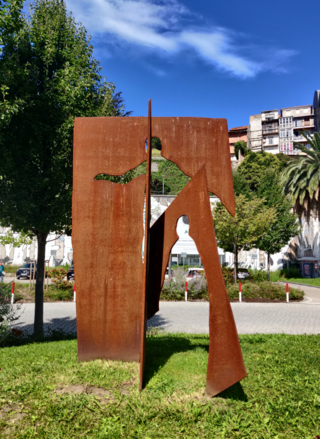
Remembrance Day is a memorial day observed in Commonwealth member states since the end of the First World War to honour armed forces members who have died in the line of duty. The day is also marked by war remembrances in several other non-Commonwealth countries. In most countries, Remembrance Day is observed on 11 November to recall the end of First World War hostilities. Hostilities ended "at the 11th hour of the 11th day of the 11th month" of 1918, in accordance with the armistice signed by representatives of Germany and the Entente between 5:12 and 5:20 that morning. The First World War formally ended with the signing of the Treaty of Versailles on 28 June 1919.

Madrid Atocha, also named Madrid Puerta de Atocha–Almudena Grandes, is the first major railway station in Madrid. It is the largest station serving commuter trains (Cercanías), regional trains from the south and southeast, intercity trains from Navarre, Cádiz and Huelva (Andalusia) and La Rioja, and the AVE high speed trains from Girona, Tarragona and Barcelona (Catalonia), Huesca and Zaragoza (Aragon), Sevilla, Córdoba, Málaga and Granada (Andalusia), Valencia, Castellón and Alicante. These train services are run by Spain's national rail company, Renfe. As of 2019, this station has daily services to Marseille, France.

The 2004 Madrid train bombings were a series of coordinated, nearly simultaneous bombings against the Cercanías commuter train system of Madrid, Spain, on the morning of 11 March 2004—three days before Spain's general elections. The explosions killed 200 people and injured around 2,500. The bombings constituted the deadliest terrorist attack carried out in the history of Spain and the deadliest in Europe since 1988. The attacks were carried out by individuals who opposed Spanish involvement in the 2003 US-led invasion of Iraq.

An eternal flame is a flame, lamp or torch that burns for an indefinite time. Most eternal flames are ignited and tended intentionally, but some are natural phenomena caused by natural gas leaks, peat fires and coal seam fires, all of which can be initially ignited by lightning, piezoelectricity or human activity, some of which have burned for hundreds or thousands of years.

The Retiro Park, also known as Buen Retiro Park or simply El Retiro, is one of the largest city parks in Madrid, Spain. The park belonged to the Spanish monarchy until 1868, when it became a public park following the Glorious Revolution.

On 30 December 2006, a van bomb exploded in the Terminal 4 parking area at the Madrid–Barajas Airport in Spain, killing two and injuring 52. On 9 January 2007, the Basque nationalist and separatist organisation ETA claimed responsibility for the attack. The attack, one of the most powerful carried out by ETA, damaged the airport terminal and destroyed the entire parking structure. The bombing ended a nine-month ceasefire declared by the armed organisation and prompted the government to halt plans for negotiations with the organisation. Despite the attack, ETA claimed that the ceasefire was still in place and regretted the death of civilians. The organisation eventually announced the end of the ceasefire in June 2007.

The Atocha station memorial is a memorial monument located at Atocha station in Madrid, Spain, that commemorates the 193 victims of the 11 March 2004 Madrid train bombings. Furthermore, it also honors the special forces agent who died when seven suicide bombers blew themselves up on 3 April 2004 during a raid on an apartment used by the bombers.

Reactions to the 2004 Madrid train bombings are the various responses and actions from the Spanish government, the Spanish population and from international leaders in the wake of the terrorist attacks that occurred on 11 March 2004. The bombings caused massive demonstrations in Spain, with 11.4 million demonstrators expressing solidarity for the victims and demanding answers about the attacks. Initial attribution to ETA by the Spanish gouvernent was soon followed by suspicions of al-Qaeda involvement. The bombings had a global impact, with most world leaders condemning the attacks and expressing solidarity and support to Spain. Spain and other European countries subsequently took security measures and raised terror alerts.
The controversy regarding the handling and representation of the Madrid train bombings by the government arose with Spain's two main political parties, Spanish Socialist Workers' Party (PSOE) and Partido Popular (PP), accusing each other of concealing or distorting evidence for electoral reasons.

The Guanche Armed Forces was the armed wing of the Movement for the Self-Determination and Independence of the Canarian Archipelago, Spanish: Movimiento por la Autodeterminación e Independencia del Archipiélago Canario(MPAIAC). It was active between 1 November 1976 and late 1978, when the group unilaterally announced a "ceasefire" in what it considered to be "struggle against Spanish colonial occupation" of the Canary Islands.

The Cafetería Rolando bombing was an attack on 13 September 1974 at the Rolando cafe in Calle del Correo, Madrid, Spain which killed 13 people and wounded 71. Though no claim of responsibility was made, the attack is widely believed to have been carried out by the armed Basque separatist group ETA.
A car bomb attack was carried out by the Basque separatist organisation ETA on 11 December 1987. A vehicle containing 250 kilograms (550 lb) of ammonal was parked beside the main Guardia Civil barracks in the city of Zaragoza, Aragon, Spain; its explosion killed 11 people, including 5 children. Another 88 people were injured, the majority of them civilians.
A car bombing was carried out by the armed Basque separatist group ETA in Madrid, Spain on 6 February 1992, killing 5 people and injured a further 7. The target was a military vehicle transporting members of the army. The dead included three captains, a soldier driving the vehicle and a civilian working for the armed forces. This was ETA's deadliest attack of 1992.
The Rieucros Camp was an internment camp on a forested hillside near Mende in the French department of Lozère that operated from January 1939 to February 1942. Prime Minister Édouard Daladier established the camp by decree on January 21, 1939, to isolate members of the International Brigades from French society after the defeat of the Second Spanish Republic and subsequent exile, known as la Retirada, in the Spanish Civil War. Other "suspicious and undesirable foreign men," sometimes accused of common law crimes, were also interned. After France's entry into World War II, authorities transferred the men to the camp of le Vernet and began to intern "suspicious and undesirable foreign women" in October 1939. Following the Battle of France, Rieucros fell in the southern unoccupied zone and the Vichy regime assumed control of the camp from Third Republican authorities. In February 1942, authorities transferred the entire camp population of women and children to the camp of Brens.

Our Lady of Remembrance College, Madrid, is an infant through baccalaureate school established by the Society of Jesus in 1880, located in the Chamartín District of Madrid. According to studies by El Mundo in 2007 and 2012, it is one of the best schools in Spain.
The wedding of Prince Felipe and Letizia Ortiz was held on 22 May 2004 in the Almudena Cathedral at the Royal Palace of Madrid, Spain. At the time of the wedding, the groom was the heir to the Spanish throne. The bride was a journalist. The wedding was presided over by the archbishop of Madrid, Antonio María Rouco Varela, and was watched by 25 million people in Spain alone.
The Monument to the Victims of the Holocaust is a monument in Madrid, Spain, in memory of the victims of the Holocaust during World War II. It is located in the Three Cultures Garden in Juan Carlos I Park. Inaugurated in 2007, the monument was the first Holocaust memorial in Spain.

The Almería murders were a series of murders and tortures of three young men in Roquetas de Mar (Almería) on 10 May 1981. They lead to a subsequent trial of various members of the Spanish Civil Guard for their various crimes, known popularly as the Almería Case.
The wedding of Alfonso XIII, King of Spain, and Princess Victoria Eugenie of Battenberg took place on Thursday, 31 May 1906, at the Church of Saint Jerome the Royal in Madrid, Spain.













